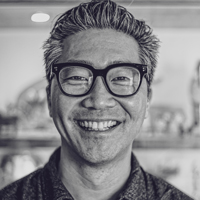Question & Innovate
A Conversation Between Platon and Guest Interviewer Bon Ku, MD
Platon is one of the world’s most renowned portrait photographers, having photographed more world leaders than anyone else in history, including six American presidents. He has photographed over 30 covers for Time magazine. In 2013, he founded The People’s Portfolio, a nonprofit foundation dedicated to celebrating emerging leaders of human rights and civil rights around the world. Platon’s life’s work is the subject of a Netflix documentary, “Abstract: The Art of Design.” In 2018, he received an honorary degree from Jefferson.
Bon Ku: You have photographed more world leaders than anyone else in history, and now you photograph the least powerful people in the world. What was the inspiration or impetus to shift?
Platon: Some years ago, I had the privilege of photographing Muhammad Ali. I went to his home, and he was very ill when I visited him. He had lost control of his once-powerful fists and arms. I remember draping the American flag over his shoulder, and he was compelled one last time to hold up his hands in the classic defiant boxing pose.
I said to him, “Muhammad, you are the greatest. Teach me to be great. How can my generation be as great as your generation had to be during the civil rights era?”
He couldn’t speak very well because of Parkinson’s. He whispered in my ear, “I have a confession to make: I wasn’t as great as I was…it wasn’t me. It was people who saw themselves in my struggle. If you can get people to see themselves in the story that you put forward, then you have a chance of achieving greatness.”
I realized at that point that power is not necessarily in authority or the establishment. There is people power. So, I still am a photographer of power, but it’s not of the old power as I used to know it. It’s people power. It’s the same thing, but driving in a different direction.
BK: You said that you believe your mission is to cure society of its amnesia. What does that mean?
P: We’ve all got the memory of a goldfish.
We all forget what happens. If something bad has happened, we’ve got to remind ourselves that happened. I used to get criticized for photographing dictators, like Putin, Mugabe, and Ahmadinejad. But the human condition is not as simple as we make it out to be in our society. We paint these dictatorial men as two-dimensional dictatorial cartoons. And they’re not. They’re three-dimensional, which can make them even more sinister.
I feel my job is to show how complicated this all is. If a dictator is capable of showing an element or hint of charm, they can inspire others. So, if we paint him as two-dimensional, we are underestimating his power and his ability to get people to follow him. I’m here to remind people that these are not men to underestimate.
BK: I want to ask you about the importance of creativity in everyone’s life, whether they’re in a creative field or not, and how we can tap into that creativity.
P: That’s a big question and deserves a big answer.
I think back to a day I spent with Quincy Jones. We all think of Quincy as this beautiful, magical creature who’s always smiling. But we forget—going back to amnesia—the battles he fought as a young Black man breaking into a white establishment. I asked him, “When you were young and you faced so many opponents who were racist, what did you say to them? How did you get through that?”
And his face dropped. The charisma stopped. Somehow he channeled this kind of power, resilience. He said, “This is what I always said to my opponents who judge me: Not one drop of my self-worth depends on your acceptance of me.”
I thought, that is epic. That is the kind of self-belief you need to break through barriers. The most valuable thing is humility, curiosity, and a determination to serve and drive positive change—in any field you are in. And anyone can do something that makes a difference.
We need everyone to be like Quincy and believe in themselves that they can be part of this pivotal moment in history, because we have some rebuilding to do together.
Guest Interviewer

Bon Ku, MD, the Marta and Robert Adelson Professor of Medicine and Design, is associate dean for health and design. A practicing emergency physician, Dr. Ku’s work has been featured in The New York Times, CNBC, Architectural Digest, and Fast Company. He hosts the Design Lab Podcast, cowrote the book “Health Design Thinking” with Ellen Lupton, and has spoken at various conferences, universities, and academic medical centers worldwide.